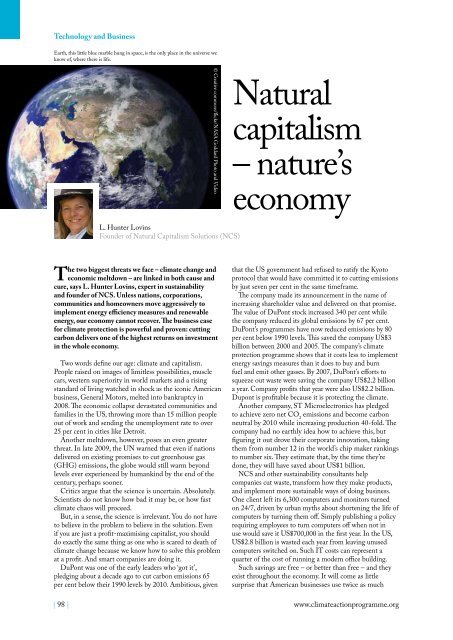Climate Action 2010-2011
You also want an ePaper? Increase the reach of your titles
YUMPU automatically turns print PDFs into web optimized ePapers that Google loves.
Technology and Business<br />
Earth, this little blue marble hung in space, is the only place in the universe we<br />
know of, where there is life.<br />
© Creative commons/flickr/NASA Goddard Photo and Video<br />
Natural<br />
capitalism<br />
– nature’s<br />
economy<br />
L. Hunter Lovins<br />
Founder of Natural Capitalism Solutions (NCS)<br />
The two biggest threats we face – climate change and<br />
economic meltdown – are linked in both cause and<br />
cure, says L. Hunter Lovins, expert in sustainability<br />
and founder of NCS. Unless nations, corporations,<br />
communities and homeowners move aggressively to<br />
implement energy efficiency measures and renewable<br />
energy, our economy cannot recover. The business case<br />
for climate protection is powerful and proven: cutting<br />
carbon delivers one of the highest returns on investment<br />
in the whole economy.<br />
Two words define our age: climate and capitalism.<br />
People raised on images of limitless possibilities, muscle<br />
cars, western superiority in world markets and a rising<br />
standard of living watched in shock as the iconic American<br />
business, General Motors, melted into bankruptcy in<br />
2008. The economic collapse devastated communities and<br />
families in the US, throwing more than 15 million people<br />
out of work and sending the unemployment rate to over<br />
25 per cent in cities like Detroit.<br />
Another meltdown, however, poses an even greater<br />
threat. In late 2009, the UN warned that even if nations<br />
delivered on existing promises to cut greenhouse gas<br />
(GHG) emissions, the globe would still warm beyond<br />
levels ever experienced by humankind by the end of the<br />
century, perhaps sooner.<br />
Critics argue that the science is uncertain. Absolutely.<br />
Scientists do not know how bad it may be, or how fast<br />
climate chaos will proceed.<br />
But, in a sense, the science is irrelevant. You do not have<br />
to believe in the problem to believe in the solution. Even<br />
if you are just a profit-maximising capitalist, you should<br />
do exactly the same thing as one who is scared to death of<br />
climate change because we know how to solve this problem<br />
at a profit. And smart companies are doing it.<br />
DuPont was one of the early leaders who ‘got it’,<br />
pledging about a decade ago to cut carbon emissions 65<br />
per cent below their 1990 levels by <strong>2010</strong>. Ambitious, given<br />
| 98 |<br />
that the US government had refused to ratify the Kyoto<br />
protocol that would have committed it to cutting emissions<br />
by just seven per cent in the same timeframe.<br />
The company made its announcement in the name of<br />
increasing shareholder value and delivered on that promise.<br />
The value of DuPont stock increased 340 per cent while<br />
the company reduced its global emissions by 67 per cent.<br />
DuPont’s programmes have now reduced emissions by 80<br />
per cent below 1990 levels. This saved the company US$3<br />
billion between 2000 and 2005. The company’s climate<br />
protection programme shows that it costs less to implement<br />
energy savings measures than it does to buy and burn<br />
fuel and emit other gasses. By 2007, DuPont’s efforts to<br />
squeeze out waste were saving the company US$2.2 billion<br />
a year. Company profits that year were also US$2.2 billion.<br />
Dupont is profitable because it is protecting the climate.<br />
Another company, ST Microelectronics has pledged<br />
to achieve zero net CO 2<br />
emissions and become carbon<br />
neutral by <strong>2010</strong> while increasing production 40-fold. The<br />
company had no earthly idea how to achieve this, but<br />
figuring it out drove their corporate innovation, taking<br />
them from number 12 in the world’s chip maker rankings<br />
to number six. They estimate that, by the time they’re<br />
done, they will have saved about US$1 billion.<br />
NCS and other sustainability consultants help<br />
companies cut waste, transform how they make products,<br />
and implement more sustainable ways of doing business.<br />
One client left its 6,300 computers and monitors turned<br />
on 24/7, driven by urban myths about shortening the life of<br />
computers by turning them off. Simply publishing a policy<br />
requiring employees to turn computers off when not in<br />
use would save it US$700,000 in the first year. In the US,<br />
US$2.8 billion is wasted each year from leaving unused<br />
computers switched on. Such IT costs can represent a<br />
quarter of the cost of running a modern office building.<br />
Such savings are free – or better than free – and they<br />
exist throughout the economy. It will come as little<br />
surprise that American businesses use twice as much<br />
www.climateactionprogramme.org












